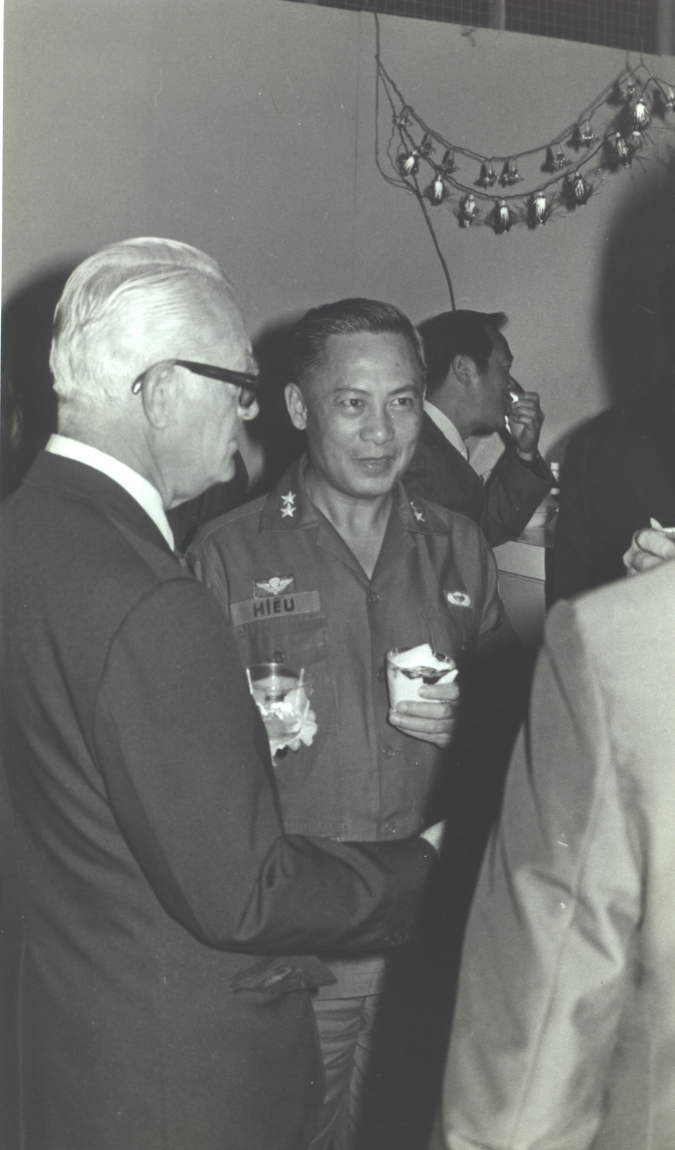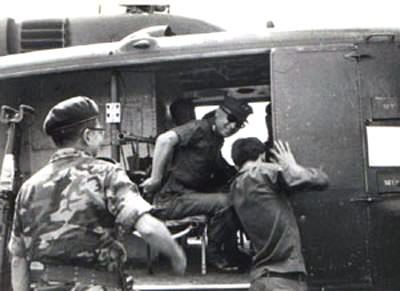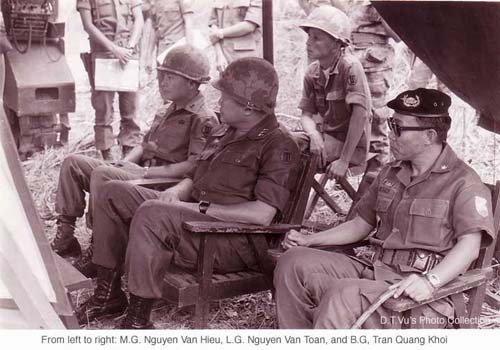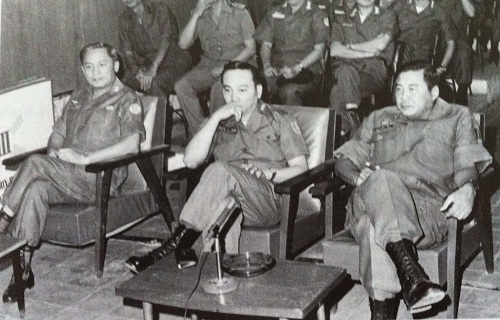
After having his bodyguard gunned downed General Hieu, General Toan reported back to President Thieu that the mission of killing General Hieu that the President had ordered had been accomplished (see Shroud over General Hieu's Mysterious Death Unveiled). Why did Thieu give that order? A former ARVN Captain belonging to the 2nd Infantry Division addressed an implicated interrogation to Thieu on this issue during his appearance with the Vietnamese community in Orange County, California, on 6/16/1990.
Was the motive related to covering the corrupt clique? No, Thieu killed General Hieu because he suspected General Hieu was fomenting a coup. Thieu had previously killed General Nguyen Viet Thanh and General Do Cao Tri when he suspected the two General of fomenting a coup.
According to the American intelligence, General Thanh did not die due to the collision of a US Cobra helicopter with the C&C helicopter of General Thanh, who was flying over the Cambodian sky to supervise the cross-border operation. It was gunned down by a heat-seeking rocket shot from the ground by an IV Corpsí artillery unit. The Americans were quite displeased because Thieu blamed them for the accident.
Thieu suspected that General Thanh had colluded with General Tri in planning to launch a coup after the cross-border operation and struck first.
In the case of General Tri, Vo Long Trieu wrote:
- If I launch a coup, do you think it is advisable? To tell you the truth, since I hold military power until these days, I have never lost a battle. The Americans respect me on this matter, and they always satisfy all my demands.
I was caught by surprise. Do Cao Tri looked at me intrigued because he did not get response from me. Meanwhile, I was thinking: my buddy wants to launch himself into doing something great. As I wrote in the first volume of my memoir, Vice President Nguyen Cao Ky had proposed to me twice. In those instances, I did not feel anxious at all. This time around, maybe because Do Cao Tri is very dear to me, I was more concern about him than about me. My silence lasted more than one minute and weighed down heavily on the two of us. I asked again:
- Do you think you can carry out a successful coup?
- Thatís only a simple game for me.
- Donít joke around. Are you suffering a high fever that causes you to hallucinate?
- Look, donít you forget that I am the III Corps commander, and Lieutenant General Minh is my younger underling and is holding the position of Saigon Military Governor? And all my other underlings that you donít know. You know quite well my military career. How about you, do you think you can assume the responsibility of steering the nationís ship?
- It certainly I possess the capacity. Furthermore, with the help of an abundance of friends, I can deal with any issues. However, let's think carefully about this matter. Letís wait until you recuperate your health, and we shall talk again further.
(...)
Lieutenant General Do Cao Tri believed he could cement unity in the army and as far as I am concerned, I thought I was more than capable of implementing projects that would excite the entire nation into building up the economy, into establishing social equality, and into destroying the Communist activities and propaganda. We discussed in-depth and were very cautious. Finally, we decided against putting in effect the plan of replacing President Thieu. General Tri quietly and deftly made preparations to act, but it appeared that Nguyen Van Thieu suspected that something was going on. I did not know for sure but only had an intuition.
Then one day, LTG Tri seemed worried when he sought my opinion regarding the proposition of the American advisors of having his helicopter parked on the American parking lot for more security. I responded to him: ďYou are in charge of the security of the entire region III, would you not be able to secure your helicopter?Ē Afterward, LTG Tri replaced the entire helicopter crews with members of his relatives; among them was Major Dang, one of Do Cao Triís uncles. A week later, Tri asked me again: ďThe Americans told me that since I do not agree to park my helicopter on their parking lot for security then, at least let them perform the mechanical checking before a flight. What do you think?
Any common person would have hundreds of questions, except the two of us. We were unconcerned, unwise. Was it because the doing of someone high up or was it Do Cao Triís destiny had reached its end? Nevertheless, both of us reasoned that, since the helicopter was made by the Americans, our mechanics were trained by them, then it should be reasonable and logical to have them do the checking. Two days later, the helicopter exploded in fire. The entire crews perished with LTC Do Cao Tri.
The American officials warned General Tri that Thieu could temper with the mechanics and caused a helicopter accident. Who could have fathomed that Thieu maliciously used Francois Sully, a French correspondent, to bring the explosives on to the helicopter? Vo Long Trieu added:
The official version given by the government on the radio and television was that the aircraft of the III Corps commander was shot down by Viet Congís rocket. Much later, Do Cao Triís elder brother, dentist Do Cao Minh, currently living in France, told me about a confidential revelation of Colonel Chiem, a Do Cao Triís underling, in charge of security at the Presidential Palace, addressed to Do Cao Minh as following: That morning, Newsweekís correspondent, Francois Sully, had an audience with President Thieu at 8:00 am; he was scheduled to meet with LTG Do Cao tri at 9:00 am to accompany him on a Cambodian battlefront inspection trip. The protocol dictated that even high ranking officials must leave their suitcase at the front desk or with the attache. After the audience session with Thieu, Francois Sully departed with his briefcase. It was not known that during the interval if anybody had inserted a ticking bomb in the briefcase.
Thieu was suspicious of General Hieu since the day the latter was 5th Division Commander. At one time, General Tri was discarded from III Corps. The event happened as follows: In October 1970, President Thieu cleverly pushed aside General Tri out of the helm of III Corps and exiled him to France for health reason, replaced by General Nguyen Van Minh. In the letter dated 6 June 1970, Captain Wayne T. Stanley, secretary of G3 of the American Advisors of the 3rd Corps, wrote to Lieutenant Colonel John L. Huestis, Fort Braggs, North Carolina: "General Tri continues to rule the land with fire and determination. He is now on vacation in Europe, and he continues to plan on being CG, III Corps until he retires in 18 months." After a while, General Tri was able to make arrangements for his return. Upon setting foot on the homeland, he immediately went to 5th Division HQ and stayed put with General Hieu. He threatened to use force with the aid of units of the 5th Division. President Thieu was forced to relent and gave back III Corps command to General Tri.
After General Triís death, Thieu looked for a way to discard General Hieu off the command of the 5th Division. Thieu was even even more distrustful of General Hieu, when, after the retreat of Snoul in May 1971, General Nguyen Van Minh reported to him that General Hieu planned to use tanks from the III Corps Armored Assault Task Force which was attached to the 8th Task Force for the withdrawal to launch a coup, according to Brigadier General Tran Quang Khoiís words.
In June 1971, General Hieu was relegated to a "sine qua non" position in I Corps, as the assistant to Commanding General Hoang Xuan Lam. Afterward, in February 1972, he was taken out of the military domain as an assistant to Vice President Huong in charge of anti-corruption.
Suddenly, in December 1973, he was assigned to the position of III Corps/Operations Deputy Commander, as requested by General Pham Quoc Thuan, who needed the help of someone excellent in strategy and tactics to assume the delicate task of defending the surrounding areas of Saigon. Thieu made sure that General Hieu would not have troops in hands as a deputy commander under three commanding generals whose loyalties Thieu could count on Thuan, Dong, and Toan.
But then when he saw that the Americans got closer and friendlier to General Hieu, Thieuís suspicion grew in intensity, especially when the Americans put pressure on him to resign three times.
General Hieu often frequented the Frankbleau apartment belonging to the American Consulate General in Bien Hoa. It was a club for meeting and entertainment of American high officials. ARVN high ranking officers of III Corps were also allowed to use the facility, especially officers from the AFVN Bien Hoa 3rd Air Wing Regiment, such as Brigadier General Huynh Ba Tinh, Commander, Colonel Nguyen Van Tuong, Deputy Commander and Colonel Nguyen Van Le, Chief of Staff; these gentlemen oftentimes spent times there to watch movies, drink liquors and dance. Not like the airmen who drank heavily, General Hieu never drank more than one glass of strong alcohol. He was fond of the television series Hawaii Five-O; he especially requested to have the movie The Bridge on the River Kwai, projected for his view five times and commented on the heroic attitude of the British commander. Furthermore, he was often invited by the American Consul General to his private residence for dinner, chess-playing, teatime, and chatting.

With Consul General Walshinshaw at the Frankbleau club
General Hieu reciprocated by often inviting Mr. Peters to pistol shooting at the Lai Khe firing range. This latter got the chance to witness General Hieuís marksmanship and his capacity to shoot from both hands.
General Hieu was well aware that his relationship with the American officials was closely monitored by Thieuís secret service agents.
When Thieu saw that General Dong gave full authority to General Hieu in the conduct of III Corps, and especially when General Dong requested the Airborne division to come to the rescue of Phuoc Long, Thieu replaced him with General Toan to be more secure.
On April 2, 1975, when a forward command post was needed to be set up at Phan Rang, Thieu initially assigned General Hieu to meet with General Phu at Lau Ong Hoang to incorporate the remnant units of II Corps to III Corps. However, when he noticed that General Hieu had troops at his disposition, he reassigned General Hieu back to his previous position and dispatched General Vinh Nghi to establish the battlefront at Phan Rang instead. General Pham Quoc Thuan was surprised to see General Hieu still in Bien Hoa: ďWhat is this? I thought you had been assigned to Phan Rang. How come you are still here?Ē General Hieu just smiled back.
Thieu was more afraid when he saw that General Weyand, Presidentís Ford special envoy, on a fact-finding mission did not see General Toan and met with General Hieu instead, all morning on April 4, in the presence of General Smith and Colonel Le Gro, DOAís commander and senior intelligence officer respectively (see Vietnam Assessment Report). Only Clinton E. Granger, a minor member of the Weyand team, met with General Toan (see Vietnam Situation in April 1975)
On April 6, while on an inspection tour of combat units, General Hieu was notified by General Toan that the President wanted to see him immediately at the presidential palace. Concerning this meeting, Thu Lam wrote in Fallen Leaves: Uncle Huong had told Xuan that morning that Hieu had recently refused to cover up the indiscretion of some of 'Thieu's cronies. He had also openly opposed Thieu's policy of retreating troops from strategic areas, "giving up and leaving more territory to the Communists". In this meeting, according to Charles Lahiguera, Deputy Consul General of Bien Hoa, he ďadvised him, if the Americans refuse to intervene again as promised by President Nixon, to surrender to prevent needless bloodshed among the troops.Ē
When the American side saw that Thieu had the intention to eliminate General Hieu, they offered to take him and his family by helicopter to the 7th Navy Fleet. General Hieu declined the offer and told his father: "I will never quit fighting. And I will never let Thieu silence me. I will die fighting, out there on the battlefield or right here in my office. I won't quit until I give my last drop of blood. You can stake our honor on that."
General Hieuís ground movements were protected at a distance by security agents of American intelligence. Whenever he traveled from Bien Hoa to Saigon to visit his family, he used to drive himself the car, with his chauffeur sitting next to him on the passenger side, and was not afraid to be assassinated by the Viet Cong. He was advised to discontinue this unsafe conducttemporarily. The air force people from the 3rd Air Wing Squadron also step up the maintenance and security of General Hieuís helicopter.

Although he was well aware that his life was in danger, General Hieu carried on his task of making preparations for countering the rapid advance of the North Vietnamese troops. He gave a hint of his counter-attack planning to the American officials: ďHe has made a detailed study of Red Army defeat of German invasion forces in Russia in World War II and obviously admires the Russian performance.Ē

One person was concerned with the survival of the country, the other person with the keeping of the presidential seat.

General Hieu Ė General Lu Lan Ė General Toan
III Corps headquarters April 1975
When they saw they did not succeed in persuading General Hieu to take his family into fleeing the danger, the American officials proposed to him to carry a Cross pen embedded with a sensor device for protection.
 It was this device that allowed American intelligence to detect the time and manner of General Hieuís death. It was unexpected that the bad guys made use of an assassin that had the conditions to choose to act in day-light, in the office, surrounded by the headquarters military staff getting ready for lunchtime.
It was this device that allowed American intelligence to detect the time and manner of General Hieuís death. It was unexpected that the bad guys made use of an assassin that had the conditions to choose to act in day-light, in the office, surrounded by the headquarters military staff getting ready for lunchtime.
Nguyen Van Tin
02 July 2015
Updated on 7.13.2015
- Cựu TŰ̉ng ThŰ́ng ThiỊ́u Trả Lời VÍ̀ Cái ChÍ́t Của Tướng HiÍ́u
- Shroud over General Hieu's Mysterious Death Unveiled
- Why Did President Thieu Killed General Hieu?
- General Hieu As Chessman in President Thieu's Chess Game
- General Hieu's Frustration
- A Mysterious Death